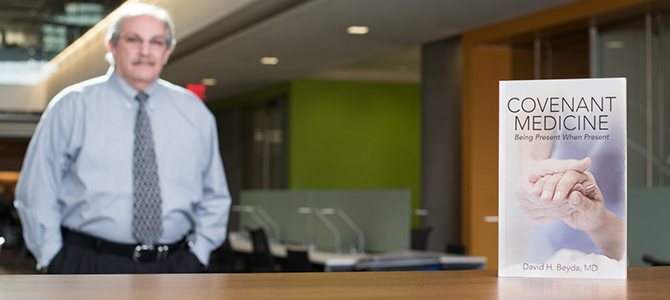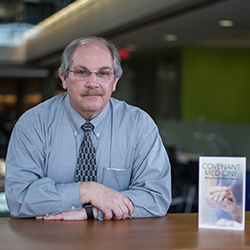
Medical School Professor’s Book Discusses the Importance of Relationships in Medicine

The experiences doctors encounter have the potential to change their entire perspective on medicine; they can alter the way they currently practice medicine; and they can even reshape their medical careers. As David Beyda, MD, faced, sometimes these events can even adjust the current and future relationships doctors have with their patients.

The meeting came during his time as an attending physician at a trauma center. Dr. Beyda was doing his rounds when he was interrupted by one of his patients’ mothers, who inquired, “You really don’t know who Jeffery is, do you? You just know what he is: a bunch of broken pieces that you are trying to put back together.”
“It was an aha-ha moment for me, and I had been practicing medicine for many years,” Dr. Beyda said. “It was embarrassing, and it was also awakening not only for me, but everyone who was on rounds because for the first time, we understood that we were simply there treating him like she said — a bunch of broken pieces rather than a child.”
Based off this experience, Dr. Beyda began focusing on who the patient is, instead of simply what their problems are. He started lecturing about the relationship between physician and patient and blogging about it. Eventually, he decided to write a book about creating personal relationships with patients and how those relationship can make the difference in a patient’s health.
“The reason I wrote this book is because medicine has changed so much,” Dr. Beyda said. “The relationships that used to exist years and years ago don’t exist anymore. It’s now like a contract.”
But the relationship between doctor and patient wasn't always that way. Dr. Beyda said that in the early eighties things began to change.
“When I was going to medical school, the view of medicine was changing,” he said. “Contracts were being established between patients and doctors. These days, all patients want is the quick fix; it’s a contract”
Instead of doctors simply looking at the problem, Dr. Beyda suggests that doctors ask the patient more about their life and how their day is going.
“Covenant is knowing more about who you are rather than what your problem is,” he said. “It’s about the questions you ask and your intentionality.”
Dr. Beyda lectures this concept of creating personal relationships with patients to medical students at the College of Medicine. He has been teaching at the College for five years and says that one of his favorite memories was being chosen by the class of 2014 for the Master Educator Teaching Excellence award.
“No one expected an ethicist to receive this award because some of the talks I give are very controversial,” Dr. Beyda said. “It was a big surprise. It validated the fact that even though we may not like to talk about ethics at the bedside, the medical students realize it’s an important part to medicine.”
Although ethics is being taught in medical schools across the country, Dr. Beyda said that he’s told that the College has one of the largest and most robust ethics programs in the country.
Unless we start teaching medical students about this concept and truly get people thinking about it, Dr. Beyda only sees the future of medicine getting worse as society continues to become more self-driven and doctors remain focused on what the symptoms are rather than who the patient is.
“Be there and be attentional,” Dr. Beyda said. “Be there when present, that’s the key."
Dr. Beyda, who is the founder and medical director of Medical Mercy, is currently working on another book, Border Crossing: It’s Not What We Bring, But What We Leave Behind, which is set to release in May of 2016. The book is about his trips to help children and adults, in over 20 underprivileged countries, who receive little to no medical attention.
About the College
Founded in 2007, the University of Arizona College of Medicine – Phoenix inspires and trains exemplary physicians, scientists and leaders to advance its core missions in education, research, clinical care and service to communities across Arizona. The college’s strength lies in our collaborations and partnerships with clinical affiliates, community organizations and industry sponsors. With our primary affiliate, Banner Health, we are recognized as the premier academic medical center in Phoenix. As an anchor institution of the Phoenix Bioscience Core, the college is home to signature research programs in neurosciences, cardiopulmonary diseases, immunology, informatics and metabolism. These focus areas uniquely position us to drive biomedical research and bolster economic development in the region.
As an urban institution with strong roots in rural and tribal health, the college has graduated more than 1,000 physicians and matriculates 130 students each year. Greater than 60% of matriculating students are from Arizona and many continue training at our GME sponsored residency programs, ultimately pursuing local academic and community-based opportunities. While our traditional four-year program continues to thrive, we will launch our recently approved accelerated three-year medical student curriculum with exclusive focus on primary care. This program is designed to further enhance workforce retention needs across Arizona.
The college has embarked on our strategic plan for 2025 to 2030. Learn more.